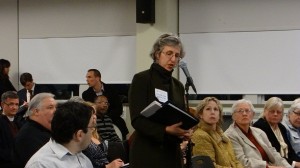
By Jenny Vickers, NJEF Communications Coordinator and Amy Goldsmith, NJEF State Director
Newark, NJ - Last week, the New Jersey Environmental Federation (NJEF), state chapter of national Clean Water Action, testified at the U.S. Coast Guard hearing on the Port Authority of NY and NJ’s (PANYNJ) “Raise the Roadway” project for the Bayonne Bridge – a project which will raise the bridge 64 feet to make room for the new generation of supersized Panamax ships. Proponents of the project are saying it will be a tremendous economic achievement and feat of engineering brilliance, yet have failed to conduct a thorough review of the project’s impacts on the environment and public health.
We believe the U.S. Coast Guard’s Draft Environmental Assessment (DEA) is deficient. It is very narrowly limited to the very few census tracts immediately adjacent to the bridge and doesn’t include any of the port adjacent communities that will bear the brunt of the increased cargo handling, truck traffic and diesel-related health impacts. That’s why NJEF joins the US Environmental Protection Agency (USEPA) and numerous other organizations and local residents in calling on the U.S. Coast Guard to conduct a full Environmental Independent Statement (EIA).
Diesel emissions cause asthma, cardiovascular disease and cancer. The New Jersey Department of Environmental Protection (NJDEP) estimates that the risk of cancer in Essex County from diesel emissions is over a thousand times higher than USEPA acceptable levels. Surprisingly, more people die from asthma in the U.S. than homicides. Asthma, corresponding hospitalization and death rates in Newark are double that of suburban towns in the same county. This is an environmental, economic and health injustice that has not been addressed on a broad scale and certainly not relative to the additional impacts associated with the raising the Bayonne Bridge.
Currently, 7,000 trucks go in and out the Port of Newark and Elizabeth every day. PNCT Terminal has already started renovations that will double its capacity. While Global Terminal does not need the bridge raised to bring in its ships, but twice as many containers (over 1 million) are anticipated to hit the road largely by truck. It is abundantly clear to us that the raising of the Bayonne Bridge will have negative impacts on local communities, but why can’t the U.S. Coast Guard see it. If we are going to raise the bridge, then we must also raise public health protections for local residents and workers through the mitigation of diesel exhaust. Trucks can be upgraded to 2007 or newer engines or retrofitted with filters that will reduce diesel exhaust by 90%; equipment, waiting areas and warehouse docks can be electrified, and; “EZpass-like ” systems can be instituted to ensure greater efficiency and less idling at the terminal gates. Up until now, the workers and area residents who suffer damaged health and higher health care bills have borne all the costs—this has got to stop. The shipping companies and others who are profiting from the project should be paying the true cost of doing business at the ports including health improving measures.
Proponents state that the raising of the bridge will be good for the economy, but it won’t create jobs for local residents. At Port Newark, the workforce consists of only 8% of Newark residents. In contrast, local residents are 18% of the workforce at the Port of Los Angeles. The annual revenue of Sealand Maersk is $25 billion while the average household income of Newark families with children is $27,000. A port driver does not do much better with an average annual wage of $28,000. Yet, the port’s failed clean truck loan program required misclassified independent truck drivers to foot the bill for upgrading their diesel trucks.
Because of these environmental and economic injustices, we are demanding a Community Benefits agreement that will ensure public health, clean environment and economic benefits for residents of Newark, not just the port. Yes, we want economic growth, but not at the expense of our health and well-being. If the Port Authority wants the project to move forward, then a full environmental review is absolutely necessary. In the meantime, the port can begin mitigating diesel emissions now. The pollution prevention technologies already exist and are proven. It is time for the port authority to “just do it”.
The referenced media source is missing and needs to be re-embedded.
Amy Goldsmith Testifying at the Public HearingRelated Posts
Stay Informed
Get the latest updates and actions:
Thanks for signing up!
There was a problem processing your signup. Please try again.


